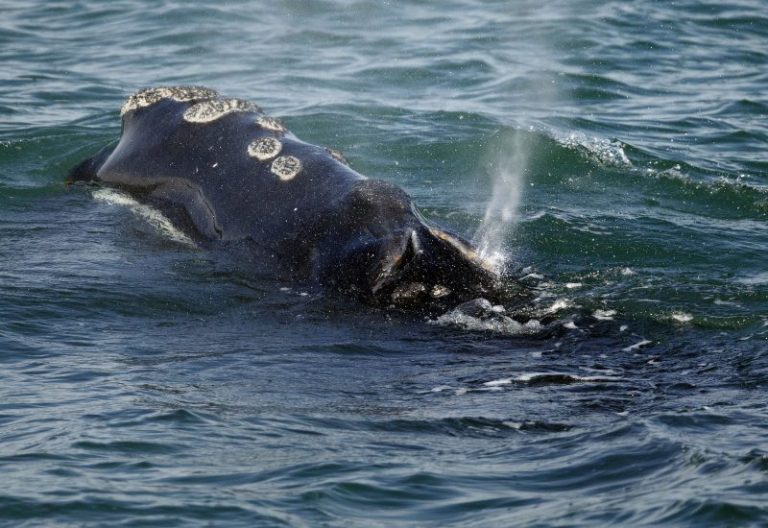Lawmakers from Maine have inserted a provision in a massive government funding bill to buffer lobstermen from new regulations, but environmental groups warn it could push the critically endangered North Atlantic right whales to the brink of extinction.
The provision could sharply curtail the federal government’s ability to prevent right whales from getting entangled in fishing lines used to catch lobsters, environmentalists say. But the bipartisan group of Maine lawmakers that pushed to include the provision, known as a policy rider, contend that the government has sought to regulate the state’s lobstermen out of business.
The language in the legislation released Tuesday sets up a clash over the species’ survival on Capitol Hill just days before government funding runs out at midnight Friday. Congress is racing to pass a set of bills, known as an omnibus, that would fund federal agencies through the fiscal year that ends on Sept. 30.
“It’s not an exaggeration to say that this rider will doom the right whale to extinction,” said Jane Davenport, a senior attorney at the environmental group Defenders of Wildlife. “Even if you got rid of all other sources of mortality, entanglements with fishing gear alone are enough to drive the species to extinction by reducing births and increasing deaths.”
Maine lawmakers on both sides of the aisle — including Republican Sen. Susan Collins, independent Sen. Angus King and Democratic Rep. Jared Golden — counter that the state’s thousands of licensed lobstermen do everything required under the law to reduce the risk of harming right whales.
“You know what kills most whales? Ships,” King said in an interview Monday evening. “Why aren’t we banning all ships all along the East Coast of the United States if we’re saying we can’t do anything that remotely threatens the whales? Instead we’re picking on 5,000 small business people in Maine. It’s unfair and wrong.”
King added that he “has been an environmentalist all my life” and boasted that he received a 100 percent score last year from the League of Conservation Voters.
Collins spokeswoman Annie Clark said in an email that “these environmental groups are seeking actions that would end lobstering in Maine.”
Maine Gov. Janet Mills (D) has joined the state’s congressional delegation in pushing for the provision, according to Clark and King spokesman Matthew Felling.
Mills could not be reached for comment.
The provision comes after a complex legal fight that pitted environmentalists against Maine fishermen and their allies on Capitol Hill. The battle began in September 2021, when the National Oceanic and Atmospheric Administration unveiled a regulation aimed at preventing fishing gear from ensnaring right whales.
A coalition of environmental groups challenged the rule in court, saying it did not go far enough. In July, a federal judge agreed with the groups, ruling that the regulation fell short of requirements under the Endangered Species Act and the Marine Mammal Protection Act.
U.S. District Judge James E. Boasberg ordered NOAA to finalize a new rule, which is expected to be more aggressive, by 2024. The Maine lawmakers are seeking to block the new rule and keep the 2021 regulation in place for six years.
However, environmentalists say the North Atlantic right whale cannot afford another six years without stronger federal protections. With only about 340 left, the whale ranks as one of the most endangered marine mammals on Earth.
“If this rider goes through, there will be blood on the hands of Maine politicians,” said Erica Fuller, a senior attorney at the Conservation Law Foundation. “With the rate we’ve been killing right whales, extinction is expected to occur between the next 20 to 40 years. In the absence of the new rule, we’ve got more years of unsustainable killing going on.”
In a statement, Golden argued that Maine’s lobster industry has been “unfairly targeted” and accused the Conservation Law Foundation and other environmental groups of abusing the legal system “by financing the lawsuits that are driving NOAA’s misguided regulations.”
In addition to blocking the new regulation, the omnibus bill also authorizes $2o million “to support the adoption of innovative fishing gear deployment and fishing techniques to reduce entanglement risk to North Atlantic right whales.” The policy rider also directs the National Marine Fisheries Service to submit an annual report to Congress on the status of right whales, including the “amount of serious injury and mortality by fishery and country.”
The fight over the lobster industry’s impact on endangered whales has stretched from the courtroom and the halls of Congress to dinner tables across America. In recent months, two major seafood guides have urged consumers to avoid eating lobsters caught in the Atlantic Ocean because of concerns about entanglements in fishing gear.
The Marine Stewardship Council announced Nov. 16 that it will stop certifying Maine’s lobsters as sustainable with its signature blue check marks. The clash even reached the White House on Dec. 1, when President Biden faced criticism for serving butter-poached lobster at the state dinner he hosted for French President Emmanuel Macron.
This year marks the 50th anniversary of the Marine Mammal Protection Act, which President Richard M. Nixon signed into law in 1972. No marine mammal has gone extinct in the United States since it was enacted, Davenport said.
“What a terrible anniversary present,” she said.

